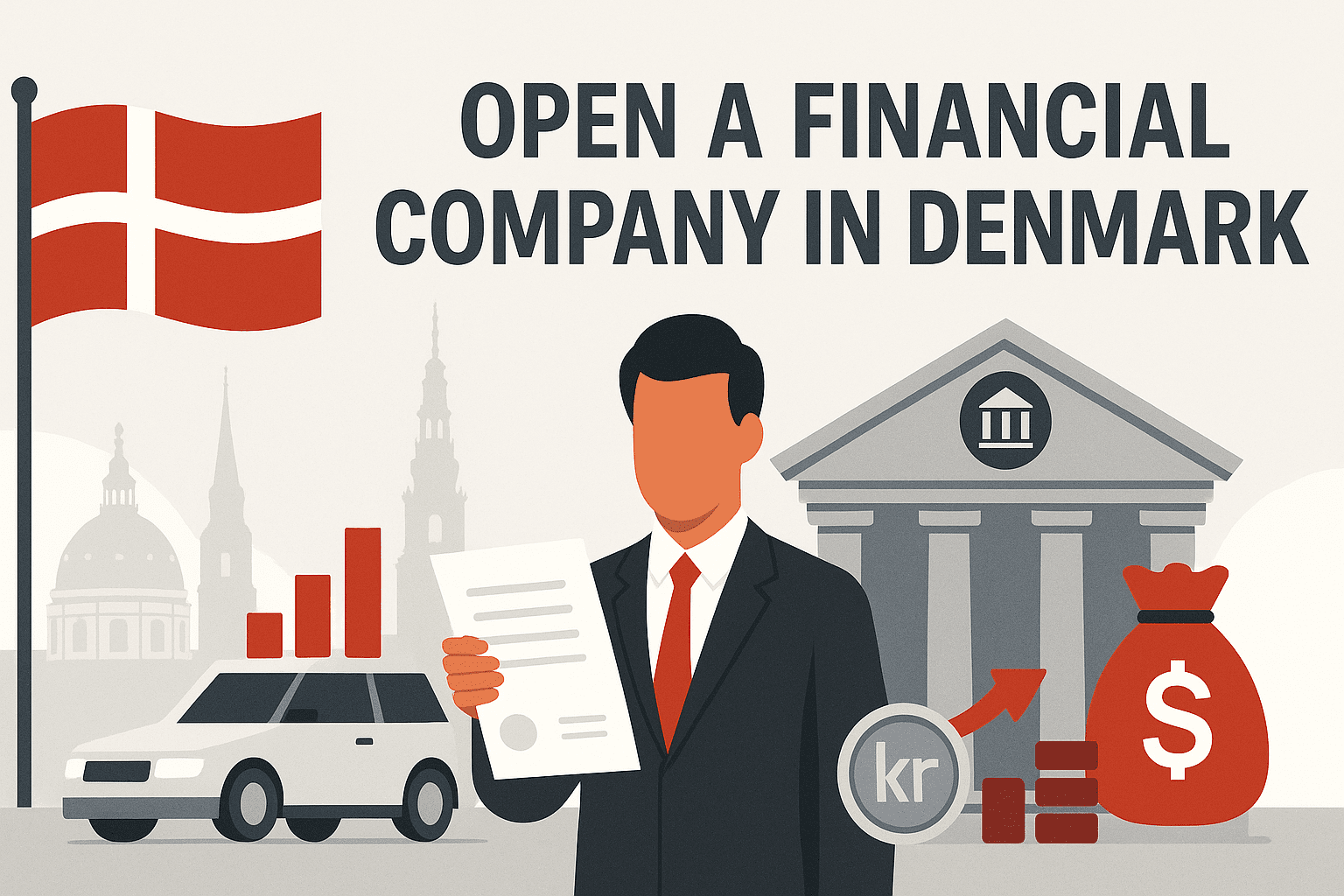Open a Financial Company in Denmark
July 14, 2025

Denmark regularly ranks among the world’s most transparent and digitally advanced economies, making it a magnet for entrepreneurs who want to open a financial company in Denmark. Whether you are an individual founder, an overseas group seeking an EU foothold, or an established fintech expanding into the Nordic market, Denmark offers:
- A well‑defined regulatory framework and fast digital incorporation
- Passporting access to the EU/EEA once authorised by the Danish Financial Supervisory Authority (FSA, Finanstilsynet)
- Competitive corporate income tax of 22 %
In this guide you will discover which activities are classed as “financial,” the licences available, capital and AML/KYC requirements, and a practical, lawyer‑approved roadmap from concept to first client.
What Is Considered a Financial Company in Denmark?
Under the Danish Financial Business Act, a financial company is any non‑bank entity that offers regulated services such as investment advice or asset management. Unlike a bank, it may not accept deposits, but it can generate revenue from:
Examples of regulated financial services
| Service | Typical Target Clients | Licence Route |
|---|---|---|
| Investment advice & portfolio management | HNWIs, family offices | MiFID Investment Firm |
| Asset management (UCITS/AIFM) | Funds, pension schemes | AIFM/UCITS Manager |
| Brokerage / order execution | Retail & B2B traders | MiFID Investment Firm |
| Corporate finance & M&A advisory | Scale‑ups, corporates | MiFID Ancillary (advice only) |
| Insurance & reinsurance mediation | SMEs, individuals | Insurance Intermediary |
Financial firms may operate B2B (corporates, start‑ups, holding structures) or B2C (retail savers, freelancers, HNWIs). A pure SaaS analytics tool usually falls outside FSA scope; once you touch client money or provide personalised investment recommendations, licensing kicks in.
Legal Requirements & Licensing
Regulator
All licences are issued by Finanstilsynet (Danish FSA). The watchdog enforces the EU’s Investment Firms Regulation (IFR), UCITS/AIFMD, PSD 2, and local AML law.
Who needs a licence?
| Activity | Just registration? | Licence? |
|---|---|---|
| General business consultancy | ✔ | – |
| Financial advice on specific instruments | – | ✔ |
| Holding client assets/securities | – | ✔ (higher tier) |
| Pure software/data provision | ✔ | – |
Capital requirements (EUR)
- € 75 000 – “Type A” advice/portfolio management, no client assets
- € 150 000 – execution brokers permitted to hold client funds
- € 750 000 – dealers on own account or underwriting desks
Source: EU IFR, adopted by Denmark 2024
Additional obligations include:
- AML/KYC programme aligned with the Danish AML Act
- Fit & proper management (clean criminal/financial record)
- Local presence: at least one resident director or “responsible person”
- Independent compliance and risk functions for larger firms
Consider retaining a specialist law firm once you draft your licence application; Finanstilsynet’s Q&A response times have lengthened to 4–6 months post‑IFR.
Step‑by‑Step: How to Register a Financial Company in Denmark
1. Choose legal form
Most foreign founders opt for a Private Limited Company (ApS) (min. DKK 40 000 capital) or Public Limited Company (A/S) (min. DKK 400 000). Branch registration is possible if you already run a licensed entity elsewhere in the EEA.
2. Draft constitutional documents
Include share structure, object clause covering “provision of regulated financial services,” and shareholder rights.
3. File online with the Danish Business Authority (Erhvervsstyrelsen)
Upload documents via Virk.dk and pay the DKK 670 incorporation fee. A CVR number (unique business ID) is usually issued within 1 day.
4. Register with SKAT (Tax Agency)
Activate VAT (if you will bill consultancy) and payroll tax codes.
5. Apply for your Finanstilsynet licence
Prepare a 200‑page application pack: business plan, capital proof, projected P&L, AML policy, IT security memo, outsourcing contracts. Expect 3–9 months for approval depending on complexity.
6. Open a Danish business bank account
Banks will ask for the draft FSA licence and AML documents.
7. Set up bookkeeping & audit
Select a Danish‑speaking accountant; larger firms must appoint a state‑authorised public accountant (Statsautoriseret revisor) for annual audits.
Accounting, Tax & Audit Obligations
Financial undertakings face stricter disclosure:
- Corporate income tax: flat 22 % on worldwide profits for resident companies
- VAT: advisory services may be exempt; pure investment management is often outside scope—confirm with SKAT
- Statutory audit: mandatory if two of the following exceed—assets > DKK 4 m, revenue > DKK 8 m, staff > 12
- Reports must be filed in XBRL and in Danish; FSA can demand English translations for cross‑border groups
- Annual statement on client assets segregation and quarterly capital adequacy filings via the FSA portal
Advantages of Starting a Financial Company in Denmark
- Regulatory transparency – Danish law tightly mirrors EU directives, and Finanstilsynet publishes extensive guidance notes.
- Reputation & trust – Denmark scores top‑five in Transparency International’s CPI, boosting client confidence.
- Digital bureaucracy – 100 % online company formation, NemID e‑signatures, same‑day CVR issuance.
- EU passporting – Once licensed, you can notify the FSA and “passport” services into all 30 EEA states without fresh approvals.
- Remote management – Board meetings may be virtual; only a local compliance officer or “shared office” is required.
- Innovation ecosystem – Copenhagen Fintech Lab hosts 200+ start‑ups and links founders to Nordic VCs.
Challenges & How to Overcome Them
- Lengthy licensing: Build a realistic cash runway (9–12 months). Engage former FSA case‑handlers as consultants to speed the Q&A loop.
- Capital lock‑up: Initial capital must sit in a blocked account until licence is granted. Consider staging equity injections.
- Compliance overhead: Small companies still need AML officers and external audits. Outsource to reg‑tech providers to save payroll.
- Local substance: If you lack Danish‑speaking staff, hire a part‑time resident director via executive‑as‑a‑service platforms.
- Evolving EU rules: Keep watch on ESMA’s MiFIR review (2024–25) and the upcoming AML Authority (AMLA) regime that will impose direct supervision on cross‑border fintechs.
Setting up a regulated financial services business in Denmark combines Nordic credibility with full EU market access. By following the step‑by‑step roadmap in this article, founders can move from idea to operational licence in as little as six months—provided they plan capital, compliance, and local governance early.
A financial company in Denmark is not a “quick licence” jurisdiction, but it is a highly respected one. With expert legal guidance, robust AML procedures and a solid business plan, you can open a financial company in Denmark and start onboarding clients in 2025 with confidence.










